The Daily 202: Democratic committees divided over playing in primaries, with Texas as ground zero

| Democratic committees divided over playing in primaries, with Texas as ground zero |
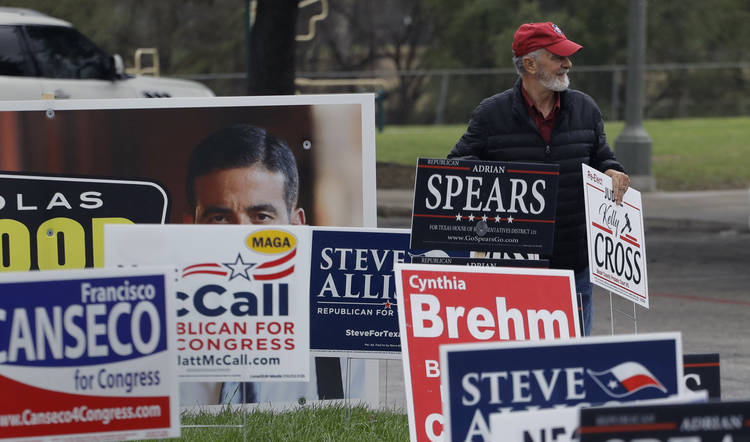
Jim Mathis places a campaign sign near a polling site in San Antonio. The Texas primaries are Tuesday. (Eric Gay/AP)
|
with Breanne Deppisch and Joanie Greve
THE BIG IDEA: The first primaries of 2018 in Texas on Tuesday could set the tune for six months of Democratic infighting.
The Democratic Congressional Campaign Committee has been taking fire from the left since publishing opposition research on Laura Moser, a progressive candidate in a crowded Democratic primary field to take on Rep. John Culberson (R). The campaign arm for House Democrats concluded that Moser could not win the general election in a suburban Houston district that Hillary Clinton narrowly carried. Among other things, she wrote a piece for Washingtonian magazine in 2014 that said she’d “sooner have my teeth pulled out without anesthesia” than move to her grandparents’ home in rural Texas.
Democratic National Committee Chairman Tom Perez does not think the DCCC should have publicized that information. “I wouldn’t have done it,” he told me and USA Today’s Susan Page in an interview that aired Sunday for C-SPAN’s “Newsmakers” series. “We’re at our best as Democrats when we talk about the issues. … I don’t believe we should be anointing candidates. The people in Texas are the people who should be making the choices in Texas.”
The public split showcased the diverging priorities of the party committees. The DCCC is willing to play the role of bad cop because leaders think it’s the only way to pick up the 24 seats needed to win the House majority. The DNC, which Perez has now led for a year, is trying to restore trust that was lost in the national party during the contentious 2016 nominating contest between Clinton and Bernie Sanders.
“One thing we’ve learned at the DNC is that when you, in fact or in perception, are trying to put the thumb on the scale in a spirited primary, that can undermine public confidence in us,” said Perez. “That’s why we’ve been neutral.”

Laura Moser picks up campaign materials at a print shop in Houston. (Michael Stravato/For the Washington Post)
A constellation of liberal groups – from Justice Democrats and CREDO to the Sanders-aligned Our Revolution – launched online petitions last week telling DCCC Chairman Ben Ray Lujan to “stop attacking progressives.”
The DCCC anticipated this blowback. The veteran operatives who work there could have easily placed each of the “oppo hits” on Moser in the press with no fingerprints attached. The fact they didn’t was as significant as the underlying content of the message. They were sending a signal about their willingness to wade into crowded primaries and gauging the reaction from the left as they plot strategy for looming primary fights.
These operatives expect that it will be imperative to intervene in California, where a jungle primary system means that the top two finishers in June will face each other in November, regardless of their party. If there are bunches of Democrats splitting the vote, that could allow two Republicans to make it to the runoff.
“As we've indicated all cycle, the DCCC is keeping all options on the table to work with our allies and ensure that there's a competitive Democrat on the ballot for voters to elect in November,” Meredith Kelly, the DCCC’s communications director, said on Sunday.
Republicans are hopeful that record numbers of Democratic primary candidates will lead to squabbling and push the eventual nominees to the left in places like Texas’s Seventh District. The Congressional Leadership Fund, the super PAC backed by Speaker Paul Ryan, has been looking for opportunities to sow division. On Friday, the group published internal polling that showed Moser gaining since the DCCC’s attacks.
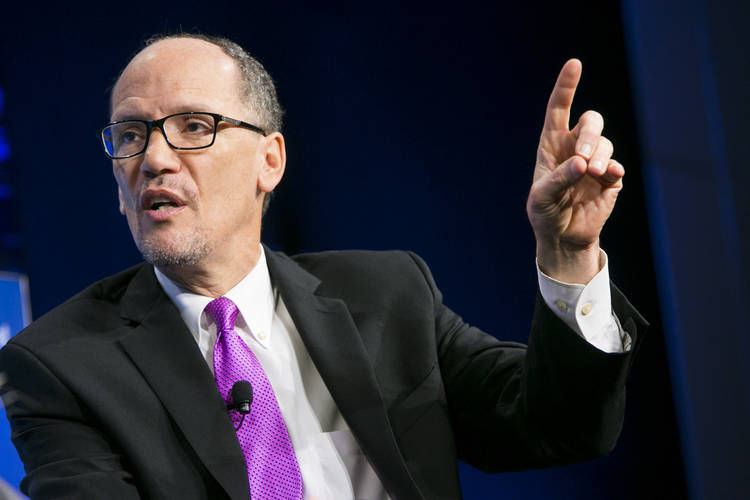
DNC Chairman Tom Perez participates in a Daily 202 Live event last year. (Kristoffer Tripplaar for The Washington Post)
Talking with Democrats over the weekend about the appropriateness of wading into primaries sparked a sense of déjà vu because I had almost identical conversations with strategists at the Republican committees and outside groups when they were out of the White House. Republicans blew a lot of winnable races during the Obama years because unelectable candidates prevailed in primaries, from Christine O’Donnell and Sharron Angle in 2010 to Todd Akin and Richard Mourdock in 2012. Allies of Mitch McConnell became more aggressive in 2014, and it helped him become majority leader. On the other hand, going after tea partiers earned the enmity of the base – and helped lead to disenchantment with the party establishment that allowed for the rise of Donald Trump in 2016.
Just like his Republican counterparts used to, Perez argued that heated primaries make his party stronger. He noted that Ralph Northam won the Virginia governor’s race last November despite facing a credible primary challenge from former congressman Tom Perriello on his left.
“Everybody who went to the polls felt like they had a fair shake, and their candidate had a fair shake,” said Perez. “It has increased turnout and it has really put wind at our back going into general elections. … We have to be careful not to confuse unity with unanimity.” (Watch the full half-hour interview here.)
Because the DNC is staying on the sidelines, the DCCC is becoming a sort of bogeyman on the left. A black Democratic candidate in Pennsylvania last week even accused the committee of trying to nudge him out of the race in favor of white candidates, which the party denied. (Dave Weigel has more on that.)
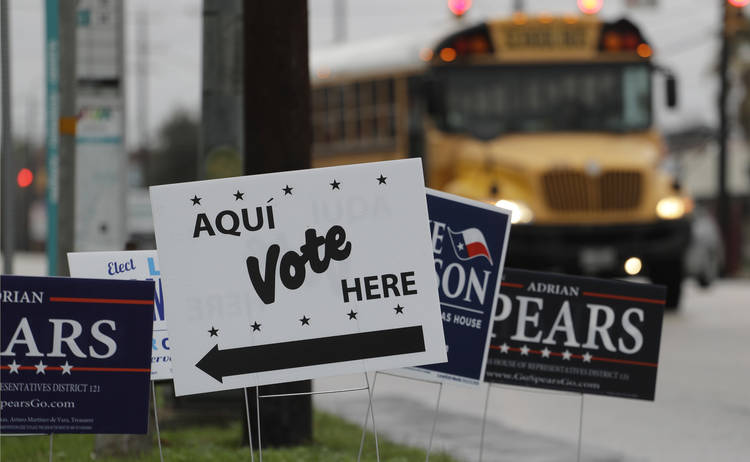
Signs point to an early voting location in San Antonio. (Eric Gay/AP)
-- Against the backdrop of this intraparty wrangling, there is growing evidence of especially strong Democratic enthusiasm:
For example, a record number of candidates are running for Congress this year. Paul Kane pulled the numbers for his Sunday column: “By Dec. 31, 2017, more than 2,100 people had taken at least the first step toward running for the House or Senate by filing the necessary paperwork, according to records kept by the Federal Election Commission. For context, that’s almost twice as many candidates who launched congressional campaigns in 2015. It represents the most candidates at this stage of the election season since the FEC started keeping these records, in 1977. …
“By Dec. 31, some 1,133 candidates had filed to run as Democrats for House seats, easily the largest crop either party has ever assembled at that point of an election cycle. Even Republicans, with 689 declared candidates for the House in 2017, have their second-largest field ever, trailing only 2009. That massive crop of 745 candidates, the second-largest ever for any party, set the stage for the 2010 midterm wave that delivered Republicans the House majority.”
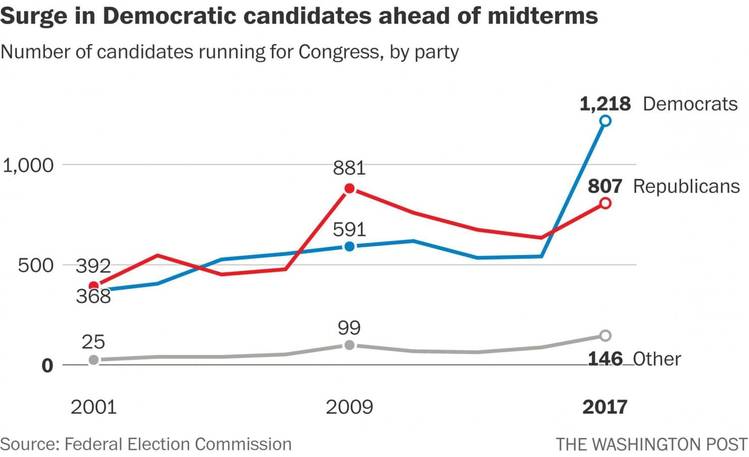
In Texas alone, there are 111 House candidates. For the first time in 25 years, at least one Democrat is running in all 36 of the state’s congressional district. In 2016, the party didn’t even field a challenger against eight GOP incumbents. “On a state legislative level, Democrats have candidates in 132 of the 150 state House districts and in 14 of the 15 state Senate districts up for election this year,” NPR’s Jessica Taylor notes. “That includes four Senate districts where Democrats didn't field candidates in 2014 or 2012, and 20 new House districts where they didn't have candidates in either 2016, 2014 or 2012.”
“Thanks largely to a huge surge in Democratic turnout, Texans in the 15 largest counties have smashed the record for early voting in a non-presidential year,” Jonathan Tilove reports in today’s Austin American-Statesman. “While there is no necessary correlation between primary and general election turnout, more than twice as many people voted early in the Democratic primaries in 2018 as in 2014, while Republican early voting crept up by 15 percent … Early voting this year in the Democratic contests was so high in Travis County [which includes Austin] that it slightly exceeded participation in 2016, a presidential year.”

Michael Capuano deplanes from Air Force One with Barack and Michelle Obama in 2013. (Josh Reynolds/Associated Press)
-- The primary season that begins tomorrow will not wrap up until September, when Massachusetts, Delaware, New Hampshire, New York and Rhode Island vote. (See the full calendar here.)
Purity tests could become a problem during the long stretch between now and then. A story on the front page of today’s New York Times notes that even Rep. Michael Capuano (D-Mass.) is facing a serious primary challenge from his left in Boston. “Mr. Capuano, who is serving his 20th year in Congress, is a down-the-line progressive … But he has stirred a challenge from Ayanna Pressley, the first black woman elected to the Boston City Council,” Alexander Burns and Jonathan Martin report. “In a district once held by John F. Kennedy and Tip O’Neill, where college campuses abound and minority communities now make up most of the population, Ms. Pressley argues that voters should demand an activist lawmaker who is more than a ‘reliable vote.’ In an unusual show of deference to Ms. Pressley, two of the state’s highest-profile Democrats, Senator Elizabeth Warren and Representative Seth Moulton, said they would stay neutral rather than back their colleague in Congress. Representative Joseph P. Kennedy III … is behind Mr. Capuano.”
The 66-year-old incumbent has voted twice to impeach Trump, but he could still lose anyway. “My district is upset,” Capuano said. “They don’t like the Donald Trump agenda, and I’ve been as vocal as I can be.”
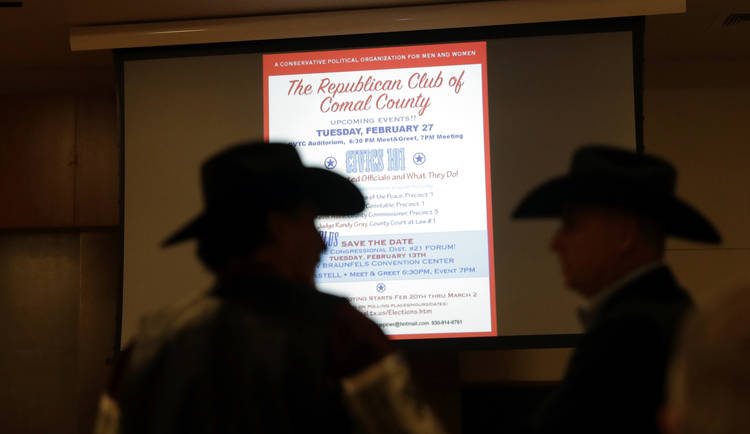
Folks attend a Republican congressional candidate forum in New Braunfels, Tex. (Eric Gay/AP)
-- But while Democrats face pressure to lurch left, Republicans feel like they must wholeheartedly embrace Trump to win a GOP primary in this environment. Mike DeBonis and Eva Ruth Moravec report on the crowded GOP primaries in Texas: “One candidate’s campaign signs declare ‘MAGA,’ referencing Trump’s mantra of ‘Make America Great Again.’ Another’s is promising to ‘drain the swamp’ and plays up his ties to a key Trump political adviser. And another’s promises to ‘Make America Like Texas,’ a slogan spelled out in the Trump campaign’s signature font. … With some notable exceptions, candidates in one especially raucous Republican primary — the 18-person contest to fill the 21st District seat being vacated by Rep. Lamar Smith — have been wary of showing any daylight between their position and Trump’s. ‘I think if you’re not with the president, you’re not going to have a chance of winning this race,’ said Jason Isaac, a state representative who is running for the seat.”
| |
 |
 |
| From Jordan Peele to Frances McDormand, the best Oscar moments |
-- “The Shape of Water” took home Best Picture at an Oscars that was rife with political moments. Dan Zak and Monica Hesse report: “‘I think that the greatest thing our art does, and our industry does, is erase the lines in the sand,’ said the winning film’s creator, Guillermo del Toro, whose victory for best director was the fourth time in the past five years that a Mexican filmmaker took home that prize. ‘We should continue doing that, when the world tells us to make them deeper.’ The industry confronted its own mistreatment of women, and defied the isolationist and nationalist tone set by President Trump, in between doling out golden statuettes — which went to a wide spectrum of films, including the horror film ‘Get Out,’ whose writer-director Jordan Peele became the first black filmmaker to win best original screenplay, and the World War II action film ‘Dunkirk,’ which scooped up three technical awards.”
There were many references to the #MeToo and Time’s Up movements: “[Best Actress winner Frances McDormand] asked all the female nominees in the audience to stand. ‘Okay, look around everybody, look around ladies and gentlemen,’ McDormand said to a cheering audience. ‘Because we all have stories to tell and projects we need financed. Don’t talk to us about it at the parties tonight; invite us into your office in a couple days.’ Nearly two and a half hours into the ceremony, three women who’ve accused Weinstein of sexual abuse took the stage: Salma Hayek Pinault, Ashley Judd and Annabella Sciorra.”
- Here is the complete list of winners.
-- Host Jimmy Kimmel’s jokes nodded to Hollywood’s sexual misconduct scandals, Trump and Fox News. Kimmel said of the Oscars’ 90th anniversary, “Oscar is 90 years old tonight, which means he’s probably at home right now watching Fox News.” (Emily Yahr)
-- “Perhaps the most palpable presence at the ceremony was its most conspicuous absence: Harvey Weinstein,” writes Ann Hornaday. “Gloria Steinem used to say before we had terms like sexual harassment and domestic violence, those things ‘were just called life.’ As heartening as it was to see Hollywood celebrating a wider array of voices and visions, real progress will come when that doesn’t come under headings of ‘inclusion’ or ‘diversity,’ but will just be called the movies.”

Activists with Casapound, a far-right movement turned political party, wave flags during a rally at the Pantheon square in Rome. (Andreas Solaro/AFP/Getty Images)
-- Siren from Rome: The populist contagion has infected Italy. “Italian populists of all leanings took a hammer to their country’s old political order in Sunday elections, crushing traditional centrist parties in favor of a kaleidoscope of alternatives on the left and right and upending their former system,” Michael Birnbaum reports from Rome.“The vote plunged Europe’s fourth-largest economy into an uncertainty unique even to a nation known for cycling through leaders at a rapid clip. The shattering of the political landscape ruled out most plausible alliances among parties. But voters did not offer a clear direction for the future as they struggle with a stagnating economy and an influx of migrants, even as more than half voted for anti-establishment parties.
“The surging outsider Five Star Movement captured more voters than any other party, about 32 percent, according to projections based on initial vote counts, meaning it is likely to play a key role in any governing coalition. In an extraordinary result, it appeared to have won nearly as many votes as the mainstream center-left and center-right parties combined. Italy’s complicated electoral system could lead to initial results shifting slightly, but politicians of all stripes were treating the first projections as an earthquake.
“The election drew the attention of anti-establishment crusaders from around the world, who saw the roiling populist energy of the campaign as a harbinger for other European nations. … Stephen K. Bannon was among the people who traveled to Rome to see the final days of the campaign. Formerly fringe ideas, such as deporting 600,000 migrants who have come to Italy without proper papers in recent years, have entered the mainstream.”
-- “The contours of the new regime are still unclear, but an old one is certainly passing,” Ishaan Tharoor writes in his WorldViews newsletter. “In the weeks ahead, Italy's populists and ultranationalists will have to reckon with the actual prospect of taking power.”
 | |||||||||||||||||||||||||||||||||||
| Powerful nor'easter slams parts of East Coast
GET SMART FAST:
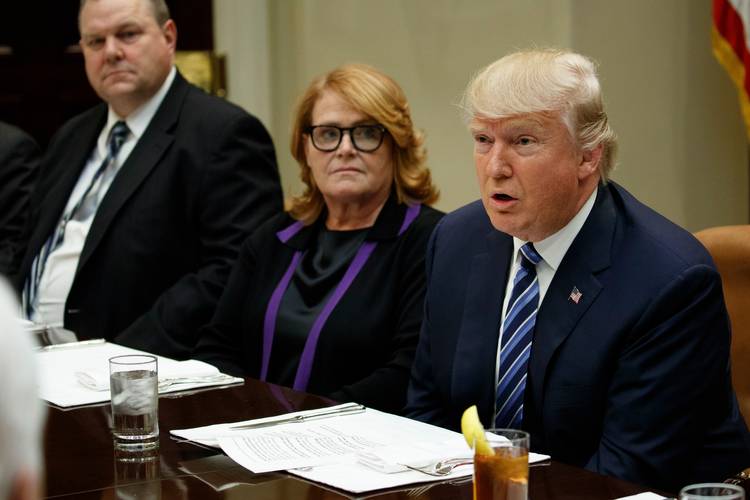
Moderate Democratic Sens. Jon Tester (Mont.) and Heidi Heitkamp (N.D.), seen here with President Trump last year, support rolling back Dodd-Frank. (Evan Vucci/AP)
THE DECONSTRUCTION OF THE ADMINISTRATIVE STATE:
-- “The Senate is preparing to scale back the sweeping banking regulations passed after the 2008 financial crisis, with more than a dozen Democrats ready to give Republicans the votes they need to weaken one of President Barack Obama’s largest legislative achievements,” Erica Werner and Damian Paletta report. “Congress’s appetite for pulling back bank regulations shows the renewed clout of the financial sector in Washington, not just in the GOP but also among Democrats. Eight years after nearly every Senate Democrat backed a sweeping set of new rules for financial firms large and small, the party is now split, with moderates, several of them facing tough midterm election contests, working with the opposing party.
“The core of the new bill exempts about two dozen financial companies with assets between $50 billion and $250 billion from the highest levels of scrutiny by the Federal Reserve … Supporters argue that the legislation would bring much-needed relief to midsize and regional banks that were treated like their much larger counterparts under the 2010 legislation known as Dodd-Frank. Opponents say it would weaken the oversight needed to stave off the type of dangerous lending and investing that brought the U.S. economy to its knees. The Senate is slated to take an initial procedural vote this week to move the measure forward, and if it eventually becomes law [as expected], it would be the most substantial weakening of Dodd-Frank since it was passed.”
“On the 10th anniversary of an enormous financial crash, Congress should not be passing laws to roll back regulations on Wall Street banks,” said Sen. Elizabeth Warren (D-Mass.). “The bill permits about 25 of the 40 largest banks in America to escape heightened scrutiny and to be regulated as if they were tiny little community banks that could have no impact on the economy.”
“Sen. Jon Tester (D-Mont.), a Banking Committee member and one of the new bill’s leading Democratic supporters, said banks in his largely rural state have been going out of business in part because of the regulations imposed by Dodd-Frank. … Financial firms upped their campaign contributions to key Senate Democrats over the last year, with [Heidi] Heitkamp, [Joe] Donnelly and Tester becoming the top three Senate recipients of donations from commercial banks so far in the 2018 campaign cycle … Senate Minority Leader Charles E. Schumer (D-N.Y.), who represents Wall Street and is often motivated by the desire to protect his vulnerable red-state incumbents, opposes the bill, but he has taken a largely hands-off approach to the debate thus far.”

The offices of a shuttered coal operation are abandoned in Hi Hat, Ky. The Appalachian Regional Commission helps areas like this. (Michael S. Williamson/The Washington Post)
A WINDOW INTO HOW WASHINGTON WORKS:
-- Boston Globe A1, “Zombie agencies are nearly impossible to kill,” by Annie Linskey: “Shortly after taking office, (Trump) identified 19 little-known federal offices for elimination. But despite his efforts to do away with what he sees as government waste, the bureaus are all still living, breathing, and spending taxpayer dollars. … From regional development commissions to arts councils, to offices responsible for fostering foreign aid, all these bureaus have continued their work ...
“A case study of sorts in bureaucratic survival is illustrated by the Appalachian Regional Commission, one of the agencies Trump initially wanted to get rid of last year. This roughly $150 million program might seem like an obvious place to slice. … As it turns out, the Appalachian Regional Commission has a lot going for it that might not be apparent at first glance. It crosses 13 state boundaries. In Washington math, that means 26 senators have a reason to care about it. (Twenty-three of those 26 senators voted to keep it alive, including 15 Republicans.) One of states served by the commission is Kentucky, which is home to Senate majority leader Mitch McConnell. In January Trump nominated one of McConnell’s top staffers, Tim Thomas, to be the federal cochairman of the commission. This year, Trump didn’t suggest eliminating the agency. It’s off the kill list.”
THE REST OF TRUMP'S AGENDA:
-- “Trump says American workers are hurt by immigration. But after ICE raided this Texas town, they never showed up,” by Nick Miroff: “In deep-red Moore County, where Trump won 75 percent of the vote, the president’s rhetoric on immigration has emboldened some of his supporters to freely vent their frustrations at the meatpacking plant they blame for bringing crime, drugs and civic decline. Their corner of northern Texas has been culturally and economically transformed, and they had never had an American president say the transformation was a bad thing. And yet, no one seemed to believe the Cactus plant would be filled anytime soon with American workers. People here were not even sure they were American jobs in the first place. At least not since the Vietnamese and Laotians showed up in the late 1970s, a few years after the plant opened.”
-- Administration officials sent mixed signals about the president’s aluminum and steel tariffs on the Sunday shows. From Anne Gearan and Karoun Demirjian: “White House trade adviser Peter Navarro appeared to draw a firm line against case-by-case exemptions as he defended President Trump's sudden imposition of new trade premiums, which are likely to hit Canada and Europe hardest. … ‘As soon as he starts exempting countries, he has to raise the tariff on everybody else,’ the adviser said [on Fox News] when asked about Canada and the European Union. … In a separate interview on CNN, Navarro suggested Trump could indeed grant exceptions if doing so would serve U.S. interests. Commerce Secretary Wilbur Ross said that although he does not expect Trump to change his mind, he does not rule it out.”
-- Trump’s constantly shifting policy positions have left congressional Republicans feeling directionless. John Wagner and Seung Min Kim report: “The legislative standoffs on guns and immigration have also underscored a larger reality about Trump’s relationship with Capitol Hill: ... He has been unable to score a major legislative victory on any issue that was not already a leading priority of Republican lawmakers. … Trump’s policy inconsistencies are sure to complicate and even stymie whatever legislative agenda he has this year, leaving a vacuum of policy details that lawmakers then attempt to fill.”

Secretary of State Rex Tillerson attends the Ministerial Meeting of the Global Coalition to Defeat ISIS in Kuwait City, Kuwait. (Noufal ibrahim/EPA-EFE)
THERE'S A BEAR IN THE WOODS:
-- The State Department has spent none of the $120 million it was allocated to combat election interference by foreign actors, reports the New York Times’s Gardiner Harris. “As a result, not one of the 23 analysts working in the department’s Global Engagement Center — which has been tasked with countering Moscow’s disinformation campaign — speaks Russian, and a department hiring freeze has hindered efforts to recruit the computer experts needed to track the Russian efforts. … [T]he funding lag reflects a deep lack of confidence by Secretary of State Rex W. Tillerson in his department’s ability to execute its historically wide-ranging mission and spend its money wisely. Mr. Tillerson has voiced skepticism that the United States is even capable of doing anything to counter the Russian threat.”
-- The State Department’s 2019 budget calls for slashing funds for the National Endowment for Democracy, reports Josh Rogin. “[The budget would also] disassemble [NED’s] relationships with its core institutes, including the National Democratic Institute and the International Republican Institute. For the NED and those institutes, the proposal is an assault not only on their organizations but also on the pro-democracy mission they are dedicated to. … The proposal initially came out of the Office of Management and Budget, even though the State Department did not formally ask for it. A senior OMB official told me the administration supports the NED’s mission but wants to consolidate the funding streams to improve oversight and accountability. But the White House didn’t provide any evidence that the current model is inefficient.”
-- In a closed-door speech, Trump praised China for ditching presidential term limits. From Amanda Erickson: “[While speaking to Republican donors at Mar-a-Lago] on Saturday, Trump joked about the term-limits move, saying Xi is now ‘president for life. President for life. No, he's great. And, look, he was able to do that. I think it's great.’ ‘Maybe we'll have to give that a shot someday,’ Trump went on.”
-- Obama’s former chief of staff Denis McDonough blamed Mitch McConnell for watering down language about Russian election interference in a letter to states about protecting their voting systems. From Karoun Demirjian: “McDonough complained on NBC’s [‘Meet the Press’] that members of Congress have shown a ‘stunning lack of urgency about this question,’ and he put the blame mostly on Republican leaders in Congress. ‘The lack of urgency that we saw from the Republican leadership in 2016, we continue to see to this day today,’ he said. ‘It’s beyond time for Congress to work with the administration, to work with the states, to ensure that our electoral systems are ready to go. This is not a game.’”
-- Axios obtained a grand jury subpoena that special counsel Robert Mueller's team recently sent to a witness in its Russia probe. The subpoena requests all communications the witness sent or received regarding Carter Page, Corey Lewandowski, Donald Trump, Hope Hicks, Keith Schiller, Michael Cohen, Paul Manafort, Rick Gates, Roger Stone and Steve Bannon from November 1, 2015 (five months after Trump announced his presidential bid) to the present.
FLORIDA FALLOUT:
-- The Florida Senate rejected a ban on assault-style weapons and advanced plans to arm teachers in proposals on school safety. The Miami Herald’s Mary Ellen Klas, Steve Bousquet and Lawrence Mower report: “The Senate is expected to approve the measure Monday and send it to the House, where leaders there hope to approve it in time for it to reach the governor’s desk before the session ends on March 9 ... The Senate rejected nearly four dozen Democratic amendments ... The four-part package focuses on mental health, firearms safety, school safety and communication and includes what [one Republican lawmaker] said was ‘the most frequent request’ — to raise the age for buying a rifle or shotgun from 18 to 21.”
-- Senators from both parties urged Trump to take a leading role in crafting gun-control legislation. From Karoun Demirjian: “‘He can set his legacy: President Trump coming forth to something like this and putting his support behind will give Republicans enough cover to support this,’ said Sen. Joe Manchin III (D-W.Va.)[.] … But the senator cautioned against adding a provision to ban semiautomatic weapons, such as the AR-15, to that bill. … Manchin also endorsed a new effort from Sen. Lindsey O. Graham (R-S.C.) that would let police or relatives of an individual who shows ‘red flags’ to petition the court to seize that person’s firearms. … ‘The president did a good job talking about — we should be able to do something to stop shootings like this,’ Graham said.”
-- Senators facing tough reelections have been conspicuously silent in the gun debate. From the AP’s Steve Peoples. “They often choose strategic silence rather than get crosswise with the National Rifle Association’s die-hard supporters on the right or the growing movement of passionate gun control advocates on the left. The office of Nevada’s senior senator, Republican Dean Heller, would not say why did he did not attend the White House meeting. Heller … has avoided the spotlight in the subsequent days as well, declining to address specifics about his positions on gun legislation. … North Dakota Sen. Heidi Heitkamp and Indiana Sen. Joe Donnelly, both Democrats running for reelection in states Trump won handily, have said nothing about gun violence from the Senate floor in recent days, but made statements honoring constituents who had recently passed away.”
-- A gun show in a conservative Chicago suburb banned sales of AR-15s. Mark Guarino reports: “Organizers halted an advertised raffle that would have awarded an AR-15 to the winner, and vendors were told they would not be allowed to sell the weapon at the monthly show. Frank Cesare — of the Pioneer Valley Sportsman’s Association, which has hosted the show for more than 40 years — said the decision followed complaints the group received after the Parkland shooting and as gun-control advocates planned to protest. … Cesare said that the ban on AR-15s also would remain in place for April’s show and that the club is ‘waiting to see’ what the mood is like before deciding on shows later in the year.”
-- Former Ohio attorney general Marc Dann (D) wrote an op-ed for the Cleveland Plain Dealer entitled, “Why I regret being in the pocket of the NRA:” “Unlike other special interests that exert influence by making campaign contributions, the gun groups spend the blood money they collect from gunmakers to misinform and then motivate voters who care about a single issue: the sanctity of the Second Amendment. … Anyone who thinks Social Security is the third rail of American politics has clearly never talked about firearms with an NRA member. While I didn't enter politics to be an advocate for the NRA, I quickly learned that unless I became one, I wouldn't be around to advocate for the issues I did care about. So I made a devil's bargain with myself: To stay in office, I adopted pro-gun positions that made me uncomfortable.”

The president, accompanied by the first lady, waves to members of the media as they arrive Saturday at Andrews Air Force Base. (Andrew Harnik/AP)
WEST WING INTRIGUE:
-- Trump has become increasingly isolated as the White House weathers a series of controversies. From Politico’s Nancy Cook and Andrew Restuccia. “[A]s president, he rarely comes into contact with regular people except in the structured setting of the White House or during tightly orchestrated events set up by staff[.] … It’s another way that Trump has obliterated the norms of the presidency, according to interviews with more than 20 current and former White House officials, Trump friends and close advisers. Rather than trying to project an air of accessibility, Trump has unapologetically stuck to his insular White House life, avoiding and more or less eliminating the optics of the president appearing in public as a citizen. The approach keeps Trump in his comfort zone but makes it harder for him to do the work of being president[.]”
-- HUD Secretary Ben Carson reportedly considered quitting amid recent budget battles. The New York Times’s Glenn Thrush reports: “‘There are more complexities here than in brain surgery,’ Mr. Carson said in an interview last week. ‘Doing this job is going to be a very intricate process.’ … While Mr. Trump treats him with respect, he views him as a beta ‘winner,’ not as a ‘killer,’ the alpha in his organizational taxonomy, according to several White House officials. That lack of influence was painfully apparent during the internal debate before the release of Mr. Trump’s budget, which would help pay for increases in military and Homeland Security spending with steep cuts to HUD’s Community Development Block Grant and core housing programs. … In private, … Mr. Carson has been profoundly frustrated, telling friends he would find it difficult to stay if deep cuts to two housing programs, focused on helping the elderly and the disabled, were enacted.”
-- As other high-profile Trump advisers have left exited, Kellyanne Conway has managed to hold on. The New York Times’s Katie Rogers and Maggie Haberman write: “In a White House with the highest turnover rates in decades, she has survived by knowing when to step back from the spotlight, keeping the president’s ear, focusing on a policy issue significant to the poor and working class, and maintaining an unflinching loyalty to President Trump even as she outmaneuvers rivals on the staff. The public criticism hasn’t abated, but Ms. Conway’s skin is thicker than it used to be. … [O]ne of her biggest strengths, those who know her say, is that she has always understood whom she works for. Loyalty to her clients always came easily, but this time, her client just happens to be in the Oval Office.”
-- A group of Trump superfans greet him as he crosses a bridge every time he visits Mar-a-Lago. Lori Rozsa reports: “They call themselves the Bridge Family. … They’re connected by a fanaticism for the president — and by their willingness to show up whenever they hear that his motorcade will cross the Southern Boulevard Bridge. … On the other side of the street, about a dozen protesters waved signs reading ‘Corruption’ and ‘Impeach.’ But on the side the president could see, it was all fans — about 60 of them[.] … He’s been known to stop the motorcade and jump out of his armored SUV to greet fans on the bridge. And last year, in March and December, he ordered his staff to bring some of the Bridge Family to Mar-a-Lago.”

Demonstrators hold a sit-in outside the White House during the People's Climate Movement in April. (Eric Thayer/Bloomberg News)
MORE ON THE MIDTERMS:
-- A recently founded PAC is helping scientists run for office. Ben Guarino and Laurie McGinley report: “Named for the first three digits of pi, 314 Action describes itself as the vanguard of ‘the pro-science resistance.’ The group’s founder, Shaughnessy Naughton, said 7,000 people have responded to the group’s call to run for office. The group has also assembled a network of about 400,000 donors eager to support candidates who back science-based policies. While a few scientist-candidates are running as independents, most are Democrats making their first foray into party politics. (More than 80 percent of scientists in a 2014 Pew survey identified as Democrats or Democrat-leaning.) 314 Action is working with 30 congressional candidates across the country and expects to formally endorse about half that number.”
-- The National Journal’s Josh Kraushaar argues that, if Republicans lose the special election in Pennsylvania, it will be “an unmistakable verdict that the healthy economy and Trump tax cuts will be overshadowed by the administration’s dysfunction and roiling suburban anger.” “Even a close loss in such a reliably conservative area would raise red flags that Democrats are on the verge of a major landslide in the November midterms. … Though the economy may play to the GOP’s advantage, the culture wars have turned squarely in the Democratic Party’s favor — and that’s what matters in today’s politics. … Republicans are eager to pin a disappointing result in this election on their candidate — state Rep. Rick Saccone—but the reality is the race is being defined on Trump’s terms.”
-- A new poll finds Virginia Republicans have not consolidated support around a candidate to oppose Sen. Tim Kaine. Jenna Portnoy reports: “Corey Stewart, the self-styled mini-Trump who nearly won the gubernatorial nomination last year, has a slight lead, but 66 percent of voters are undecided, the [Wason Center for Public Policy] poll found. The primary is June 12. The other candidates are evangelical pastor E.W. Jackson; Bert Mizusawa, a retired major general in the U.S. Army Reserve and foreign policy adviser to Trump’s campaign; two-term state Del. Nicholas J. ‘Nick’ Freitas (R-Culpeper); and political newcomer Ivan Raiklin. Stewart enters as the most well-known candidate with the support of 16 percent of potential GOP primary voters. Jackson has 7 percent, followed by Freitas with 6 percent.”
SOCIAL MEDIA SPEED READ:
Trump defended his decision to launch a trade war on Sunday night:
Trump singled out NAFTA in a tweet this morning:
The commerce secretary offered an evergreen comment about the Trump administration on "Meet the Press”:
The communications director for Sen. Ben Sasse (R-Neb.) questioned a Trump adviser's rationale for the tariffs:
Twitter responded to Trump's comment that it's “great” China's president can now serve indefinitely: From an Atlantic editor:
From a Teen Vogue columnist:
From a “Morning Joe” host:
From a Republican strategist:
From an NPR host:
The New York Times highlighted Kevin Spacey's absence at the Oscars:
Rep. Devin Nunes (R-Calif.) discussed a Fox News segment with his daughter:
Sen. Claire McCaskill (D-Mo.) hosted an Oscars viewing party:
The McCains enjoyed a day outdoors:
Ted Cruz mocked Brooklyn barbecue after this story made the rounds on Twitter:
Pun alert from a Senate Republican:
The Chicago Tribune reminded its followers that life is short after this tweet from last year made the rounds again:
GOOD READS FROM ELSEWHERE:
-- Vox, “Congress requires many unpaid interns to sign nondisclosure agreements,” by Rachel Wolfe: “For unpaid interns on Capitol Hill, secrecy is so much a part of the job that on their first day, many are required to sign sweeping nondisclosure agreements. Employment lawyers reviewed two Hill NDAs obtained by Vox and said they are written in a way that could discourage interns from speaking up about anything, potentially protecting members of Congress and their staff even in cases of harassment or abuse.”
-- Politico Magazine, “The Genocide the U.S. Didn’t See Coming,” by Nahal Toosi: “Hundreds of villages were attacked in the weeks after August 25. The assaults could last hours, leaving scores of burned or maimed corpses behind. Multiple Rohingya escapees said they saw the bodies of women whose breasts had been sliced off. … The violence has also upended what was supposed to be an American success story — the much-fêted opening to an increasingly democratic Myanmar, championed by a U.S. president, Barack Obama, eager to make friends of old enemies willing to change their behavior. For Obama’s former advisers, some of whom fought to lift sanctions on Myanmar, it is a slow-rolling disaster that gnaws at their consciences.”
-- The Intercept, “Excessive Force,” by Maryam Saleh: “For a brief moment in December 2017, the international spotlight shined on the case of 92 deportees who were on an Immigration and Customs Enforcement-chartered flight to Somalia. Most such flights unload their human cargo once they land, but this flight, for logistical reasons, returned home — and brought witnesses back with it. The Somalis told of abuse on the flight, saying they were shackled with chains on their wrists, waists, and legs for more than 40 hours; forced to urinate in bottles or on themselves; and that ICE officers beat and threatened some passengers. (ICE has denied that it mistreated detainees on the flight.) But even after the spotlight dimmed, the abuse continued.”
-- Wall Street Journal, “Your Location Data Is Being Sold — Often Without Your Knowledge,” by Christopher Mims: “Every time you say ‘yes’ to an app that asks to know your location, you are also potentially authorizing that app to sell your data. Dozens of companies track location and/or serve ads based on this data. They aim to compile a complete record of where everyone in America spends their time, in order to chop those histories into market segments to sell to corporate advertisers.”

Parker Curry, 2, stands in awe of the new National Portrait Gallery painting of Michelle Obama. (Ben Hines)
DAYBOOK:
Trump will meet with Israeli Prime Minister Benjamin Netanyahu at the White House today and later sit down with U.N. Ambassador Nikki Haley.
NEWS YOU CAN USE IF YOU LIVE IN D.C.:
-- It will be mostly sunny in D.C. today, but storms are possible later in the week. The Capital Weather Gang forecasts: “There’s definitely a chill in the air, but wind speeds are lower than they’ve been since Thursday. We have a ton of sunshine, which helps afternoon highs reach the upper 40s and low 50s. Winds, while down, are not out[.]”
-- The fallout from the high winds resulted in some school closures and delays. Here is the full list.
-- The Wizards lost to the Pacers 98-95. (Candace Buckner)
-- Police identified the man who shot himself outside the White House as 26-year-old Cameron Ross Burgess, of Maylene, Ala. Burgess fired several rounds from a handgun shortly before noon Saturday, but none of the shots were directed at the White House. (Faiz Siddiqui)
-- Despite several high-profile scandals within her administration, D.C. Mayor Muriel Bowser is not facing any opposition in her reelection bid. From Paul Schwartzman: “The mayor’s glide path to reelection may be rooted as much in the city’s economic stability as in her ability to avoid the personality-driven dramas that bedeviled her mentor, former mayor Adrian Fenty (D), whom voters rejected after one term. Yet the absence of opposition should not be interpreted as a universal embrace of the mayor’s leadership or her administration’s performance, Democratic leaders and operatives say.”
VIDEOS OF THE DAY:
The American Action Network launched a $1 million ad buy to continue promoting the GOP tax law:
The Post fact-checked whether the FCC’s net neutrality ruling will actually end the Internet as we know it:
SNL parodied Trump’s response to the Parkland shooting:
Taraji P. Henson shared this uncomfortable moment with Ryan Seacrest, who was recently accused of sexual misconduct:
One Oscars presenter explained her choice of dress:
|




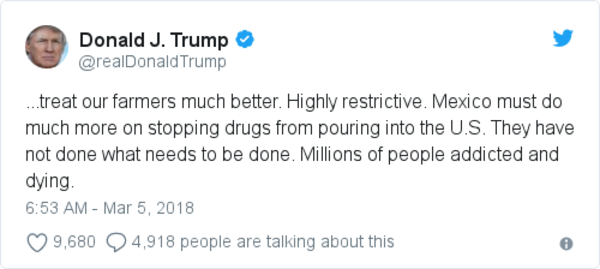


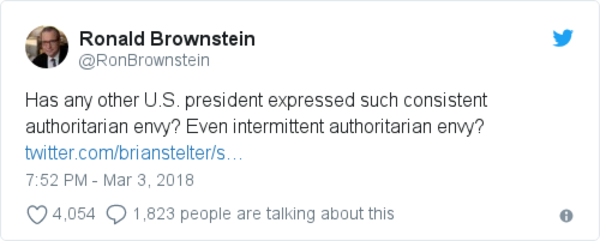
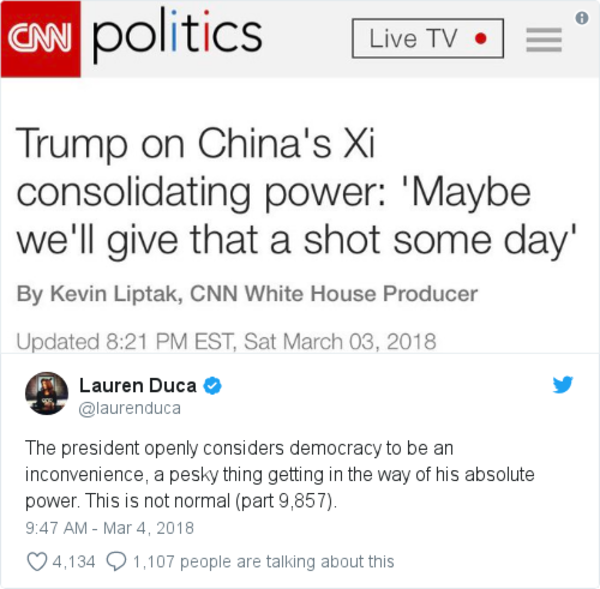
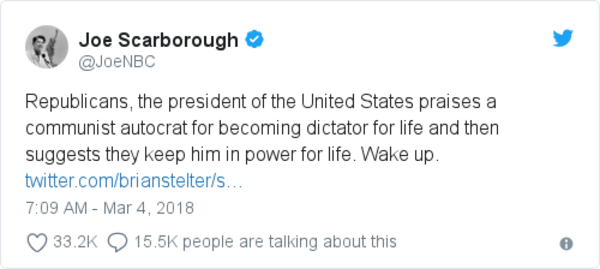






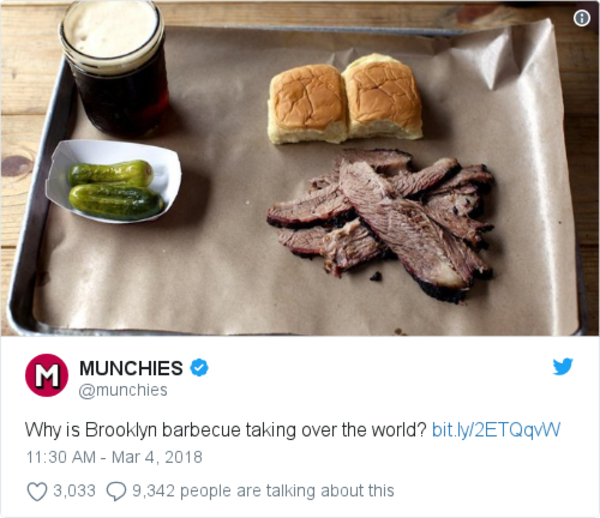





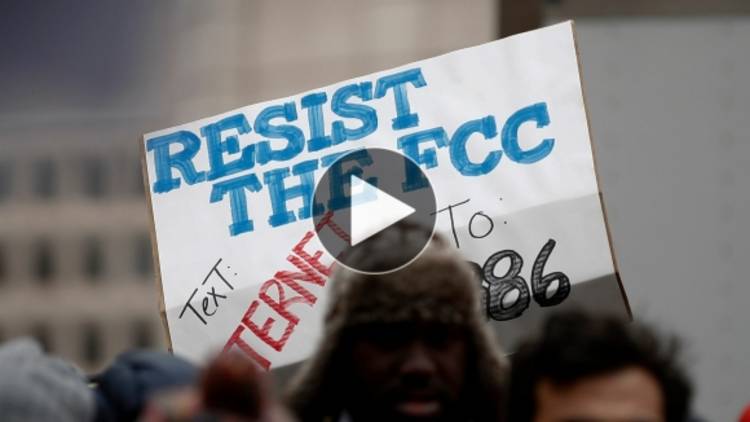
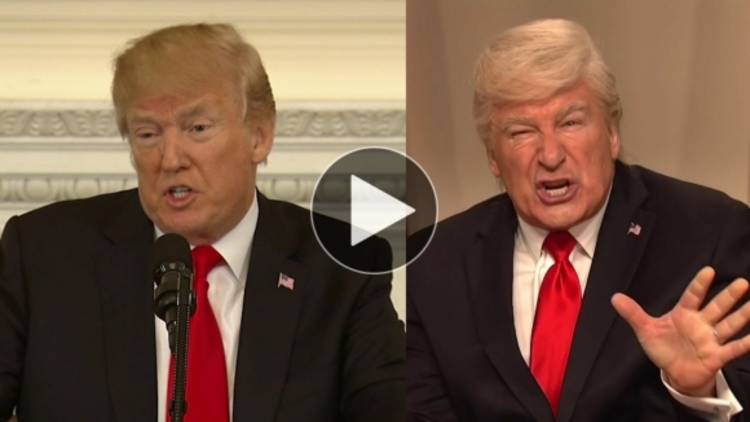


Comments
Post a Comment